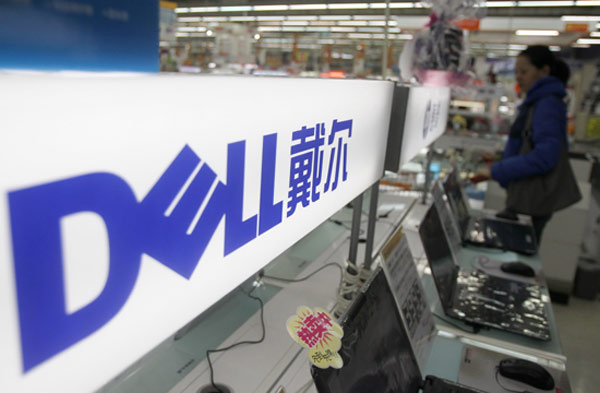BRICS cooperation expected to be global growth driver: Dell VP
 |
|
A Dell computer counter in a shopping mall in Nantong, Jiangsu province. [Photo/China Daily] |
XIAMEN — Cooperation among BRICS countries - Brazil, Russia, India, China and South Africa - will become an engine of global economic development, a senior executive of Dell has said.
Dell has large-scale investments in Brazil, India, China and South Africa and this "reflects the important position BRICS countries hold in the global economy," Huang Chenhong, Dell's global senior vice president and president of Dell Greater China, told Xinhua in a recent written interview.
Huang was one of the representatives of the 79 companies on the Fortune Global 500 list that attended the BRICS Business Forum, an important side-event of the BRICS summit. More than 600 companies from China and abroad attended the forum held Sunday and Monday in Xiamen, a coastal city in East China's Fujian province.
"BRICS cooperation is the result of economic globalization and also a driver for promoting and deepening global economic cooperation," Huang said on the sidelines of the forum. "For Dell as well as other international enterprises, BRICS countries are not only markets, but also growth drivers."
Huang said cooperation should not be limited to that among the BRICS countries or that between the five countries and other emerging economies. "Only by sticking to investment and trade liberalization can BRICS cooperation become the engine of the global economic development."
Huang also said BRICS countries have great potential in such areas as intelligent manufacturing and internet economy. "If BRICS countries have concrete and viable action plans in these areas, establish effective cooperation mechanisms and find new directions for development, it will be great news for transnational enterprises."
Besides, Huang said the fruits of BRICS cooperation can be promoted and copied in countries along the Belt and Road, namely the Silk Road Economic Belt and the 21st Century Maritime Silk Road. "This will bring broad space for cooperation to the business community, especially foreign companies in China."
In 2013, China proposed the Belt and Road Initiative aimed at building trade and infrastructure networks connecting Asia with Europe and Africa along the ancient Silk Road trade routes to seek common development and prosperity.
As a practitioner, beneficiary and promoter of the Belt and Road Initiative, Dell has been enhancing local cooperation for the better localization in purchasing, research and development, manufacturing as well as sales and service, the senior executive said.
Dell also expected that the establishment of a comprehensive logistic system with transportation via sea, air and land will greatly improve the efficiency of supply chains, Huang added.
Facing the increasing growth of trans-border e-commerce and logistics in BRICS trade, Huang said Dell will conduct all-round cooperation with its partners in supply chains, Information and Communications Technology (ICT) enterprises and other domestic companies involved in the Belt and Road Initiative in such areas as markets, networks, products and services, as an effort to promote communications in information technology among BRICS nations.
Dell is a multinational computer technology company based in Texas, the United States. Xiamen, the Chinese city that hosted the ninth BRICS Summit, has become Dell's largest manufacturing base in the world with a daily output of 80,000 pieces of equipment.
Dell CEO Michael Dell visited China in 2015 and announced the "In China, For China" 4.0 strategy, under which Dell will invest $125 billion in China over the next five years, contributing $175 billion to imports and exports while sustaining 1 million jobs.



















